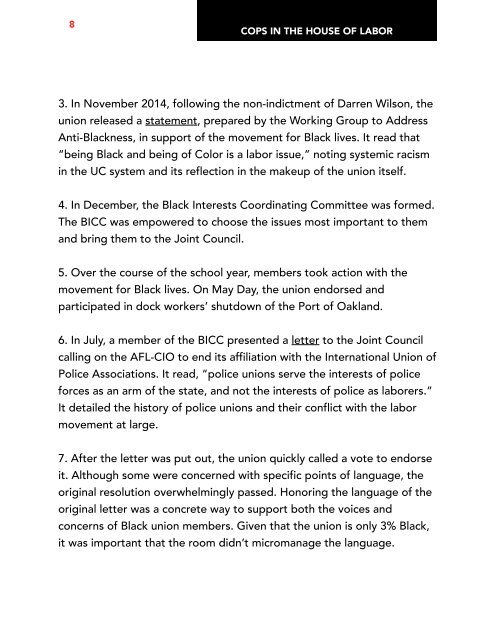Black Lives Matter at Work
black-lives-matter-at-work-young-worker-media-project
black-lives-matter-at-work-young-worker-media-project
Create successful ePaper yourself
Turn your PDF publications into a flip-book with our unique Google optimized e-Paper software.
8<br />
COPS IN THE HOUSE OF LABOR<br />
3. In November 2014, following the non-indictment of Darren Wilson, the<br />
union released a st<strong>at</strong>ement, prepared by the <strong>Work</strong>ing Group to Address<br />
Anti-<strong>Black</strong>ness, in support of the movement for <strong>Black</strong> lives. It read th<strong>at</strong><br />
“being <strong>Black</strong> and being of Color is a labor issue,” noting systemic racism<br />
in the UC system and its reflection in the makeup of the union itself.<br />
4. In December, the <strong>Black</strong> Interests Coordin<strong>at</strong>ing Committee was formed.<br />
The BICC was empowered to choose the issues most important to them<br />
and bring them to the Joint Council.<br />
5. Over the course of the school year, members took action with the<br />
movement for <strong>Black</strong> lives. On May Day, the union endorsed and<br />
particip<strong>at</strong>ed in dock workers’ shutdown of the Port of Oakland.<br />
6. In July, a member of the BICC presented a letter to the Joint Council<br />
calling on the AFL-CIO to end its affili<strong>at</strong>ion with the Intern<strong>at</strong>ional Union of<br />
Police Associ<strong>at</strong>ions. It read, “police unions serve the interests of police<br />
forces as an arm of the st<strong>at</strong>e, and not the interests of police as laborers.”<br />
It detailed the history of police unions and their conflict with the labor<br />
movement <strong>at</strong> large.<br />
7. After the letter was put out, the union quickly called a vote to endorse<br />
it. Although some were concerned with specific points of language, the<br />
original resolution overwhelmingly passed. Honoring the language of the<br />
original letter was a concrete way to support both the voices and<br />
concerns of <strong>Black</strong> union members. Given th<strong>at</strong> the union is only 3% <strong>Black</strong>,<br />
it was important th<strong>at</strong> the room didn’t micromanage the language.


